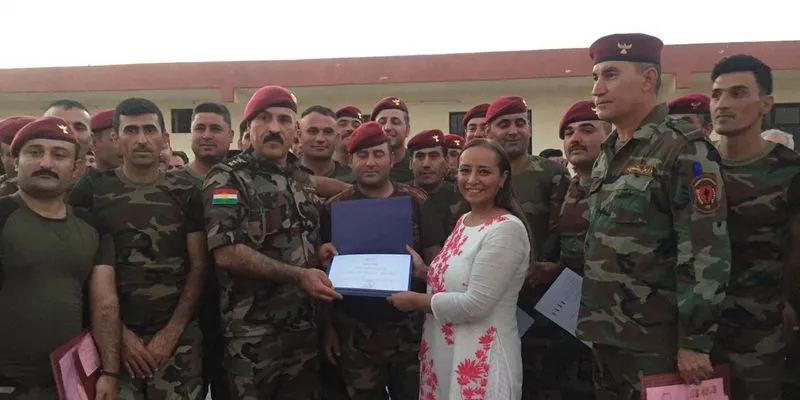Mawahib Shaibani is uplifting and empowering people in war-torn countries
In 2003, Mawahib Shaibani left a successful corporate career to join the Art of Living's mission of healing and peace in Iraq. She is now the CEO of Art of Living, Middle East and Gulf.
Mawahib Shaibani was born into privilege—a private school education in the UAE, a university education in the US, and an enviable banking career at Credit Suisse, Merrill Lynch, the National Bank of Abu Dhabi, and Mashreq Bank.
As one of the first women brokers in the country, Shaibani was destined for a high-flying corporate career.
But it had one obvious fallout–dealing with high pressure and stress. She recalls being unable to focus and dealing with anger issues.

Mawahib Shaibani with the forces
A friend introduced her to the Art of Living, a global movement founded by Gurudev Sri Sri Ravi Shankar that promotes inner peace, stress management, and spiritual growth.
Shaibani's first course marked the beginning of a profound inner transformation.
“Before, it used to take me 12 hours to do my work. After completing the Art of Living course, I could complete it in five hours with better results. I was no longer angry or stressed,” says Shaibani.
She says her focus improved, and practising Sudarshan Kriya (breathing exercise) made her calm in stressful situations. It also helped her connect to the community and society and made her feel more humane.
It also led to an epiphany–one that would change the trajectory of her life. She quit her corporate job to work with the Art of Living full-time in 2003. She is now the CEO of Art of Living, Middle East and Gulf.
“Instead of managing people’s money, I decided to manage people’s lives,” she says.
The same year, Shaibani trained as an Art of Living teacher and worked with a drug rehabilitation centre in Abu Dhabi.
Addressing physical and psychological effects of war
Shaibani’s first mission was in Iraq, during the 2003 American invasion, to bring trauma relief to women and children caught in the crossfire of war.
The physical and mental effects of the war were huge. Shaibani and her team started working with women and realised that apart from physical conditions like asthma and respiratory diseases, they also had psychological issues. They brought Ayurvedic doctors on board, and also experts to provide trauma relief.
“When wars occur, the greatest casualties are not just lives but livelihoods,” she says.
They offered workshops that helped participants manage stress, regain focus, and find resilience in despair. Alongside these efforts, Shaibani introduced vocational training, teaching women skills like tailoring and computer literacy.
Another intervention was to equip them with education–a tourism diploma in partnership with the University of Jordan for a career in the tourism industry.
Her expertise in finance also came into play. Collaborating with ministries and banks, she helped design programmes that enabled women to access microloans and start businesses.”
For over two decades, her initiatives have empowered over 35,000 women, giving them the means to rebuild their lives.
Her efforts led to a task force in 2004 to help women, youth, and governments. It addresses critical issues such as honor killings, youth empowerment, and post-conflict rehabilitation.
Her most poignant work involved Yazidi girls who had survived unimaginable atrocities under ISIS.
They rescued and rehabilitated a 15-year-old girl victim of gang rape and many other trapped women, who are sold for as little as $10. These girls had lost not just their freedom but their very sense of self. The programmes took them on the path of healing, step by step.
Ambassadors of peace
Hope for peace remains a strong driving force for Shaibani. A special programme was established in 2004 to train youth as peace ambassadors. Through Art of Living’s programmes, thousands of young people learned to channel their energy into constructive action. These youth leaders have since started businesses, repaired schools, and rebuilt their communities.
Despite the dangers of working in conflict zones, Shaibani’s resolve remains unshaken. She has faced bombings and missile attacks but continues to focus on the people she serves.
“When you have peace within you, nothing seems unsafe, because you are spreading that peace and lending a helping hand,” she states.
Shaibani recalls a trip by helicopter to the Sinjar mountains and wondering why there were fireworks at 9 am.
“The captain told me that they were Katyusha rockets aimed at us. I was saved from near-death experiences many times, but my steadfast belief in peace only grew. When my mother gets worried, I tell her I can die even in my sleep, so I’d rather die helping others,” she says.
She continues to work with other volunteers, universities, and governments to alleviate suffering, empower and bring hope to people across Iraq, Syria, Jordan, Lebanon, and Egypt through different programmes—prison courses, stress-elimination workshops, or initiatives for women’s leadership, and others. She is also committed to working on mental health awareness, which is her focus.
What keeps her going?
“People tell me, ‘We only knew death, now we know the art of living. What else does one need to hear? Saving even one life is important to me. When I see transformation in people and communities, it keeps me going.”
Edited by Megha Reddy






